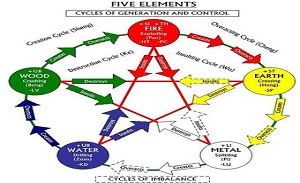The Taoist Five Elements
The Five Elements are Fluid Categories
 To understand the use of the Five Element system in Qigong, Chinese Medicine, and other Taoist practices, it’s important to know that the elements – like Yin and Yang – are fluid rather than static categories. For this reason, they’re often referred to as the “Five Phases” or “Five Transformations” or even “Five Orbs” (of influence).
To understand the use of the Five Element system in Qigong, Chinese Medicine, and other Taoist practices, it’s important to know that the elements – like Yin and Yang – are fluid rather than static categories. For this reason, they’re often referred to as the “Five Phases” or “Five Transformations” or even “Five Orbs” (of influence).
The Five Elements Support and Control Each Other
Everything we find in our external or internal terrain belongs to one of the Five Elements, each of which has supporting and controlling relationships with the other elements. When the Five Elements – within our bodies or external environments – are balanced, we experience health and prosperity. When they’re out of balance – overacting, counteracting, or failing to properly support one another – we experience dis-ease of one sort or another.
Wood Element Correspondences
Yin Organ: Liver
Yang Organ: Gallbladder
Season: Spring
Color: Green
Flavor: Sour
Sense Organ: Eyes
Tissue: Tendons
Odor: Rancid
Direction: East
Emotion: Anger
Virtue: Kindness
Planet: Jupiter
Sound: Shouting
Musical Note: mi
Heaven Stems: Jia & Yi
Environment: Wind
Domestic Animal: Goat/Sheep
Five Animal Qigong: Tiger
Developmental Stage: Birth
Fire Element Correspondences
Yin Organ: Heart/Pericardium
Yang Organ: Small Intestine/Triple Burner
Season: Summer
Color: Red
Flavor: Bitter
Sense Organ: Tongue
Tissue: Vessels
Odor: Scorched
Direction: South
Emotion: Anxiety
Virtue: Joy
Planet: Mars
Sound: Laughing
Musical Note: sol
Heaven Stems: Bing & Ding
Environment: Heat
Domestic Animal: Chicken
Five Animal Qigong: Monkey
Developmental Stage: Growth
Earth Element Correspondences
Yin Organ: Spleen
Yang Organ: Stomach
Season: Late Summer
Color: Yellow
Flavor: Sweet
Sense Organ: Mouth
Tissue: Flesh/Muscle
Odor: Fragrant
Direction: Center
Emotion: Worry/Pensiveness
Virtue: Equanimity
Planet: Saturn
Sound: Singing
Musical Note: do
Heaven Stems: Wu & Ji
Environment: Dampness
Domestic Animal: Ox
Five Animal Qigong: Bear
Developmental Stage: Transformation
Metal Element Correspondences
Yin Organ: Lung
Yang Organ: Large Intestine
Season: Autumn
Color: White
Flavor: Pungent
Sense Organ: Nose
Tissue: Skin
Odor: Rotten
Direction: West
Emotion: Grief/Sadness
Virtue: Courage
Planet: Venus
Sound: Crying
Musical Note: re
Heaven Stems: Gen & Xin
Environment: Dryness
Domestic Animal: Dog
Five Animal Qigong: Crane
Developmental Stage: Harvest
Water Element Correspondences
Yin Organ: Kidney
Yang Organ: Urinary Bladder
Season: Winter
Color: Blue/Black
Flavor: Salty
Sense Organ: Ears
Tissue: Bones
Odor: Putrid
Direction: North
Emotion: Fear
Virtue: Wisdom/Awe
Planet: Mercury
Sound: Groaning
Musical Note: la
Heaven Stems: Ren & Gui
Environment: Cold
Domestic Animal: Pig
Five Animal Qigong: Deer
Developmental Stage: Storage
Uses of the Five Element System in Chinese Medicine & Qigong
Within the practice of Chinese Medicine, Five-Element acupuncturists – as their name implies – use the Five-Element system to diagnose and treat their patients. Chinese herbalists are more likely to make use of an Eight Principles diagnostic framework, though Chinese herbal medicine does rely heavily on the Five-Element “tastes” (sour, salty, bitter, pungent & sweet) – since it is the taste, along with the temperature, of an herb which determines its action within the body.
The Five Element system shows up in various ways within qigong practice. One simple, powerful practice is to direct our attention (using the "Inner Smile" technique) into the yin organs, in a sequence which follows the Five-Element supporting cycle: Kidney to Liver to Heart to Spleen to Lung, then back to Kidney again. Just becoming familiar with the Five Element Correspondences is a great way to enter into this terrain, and – with time – your intuition will reveal all kinds of ways to benefit from this perceptual framework.
By Elizabeth Reninger
Suorce: learnreligions.com/

